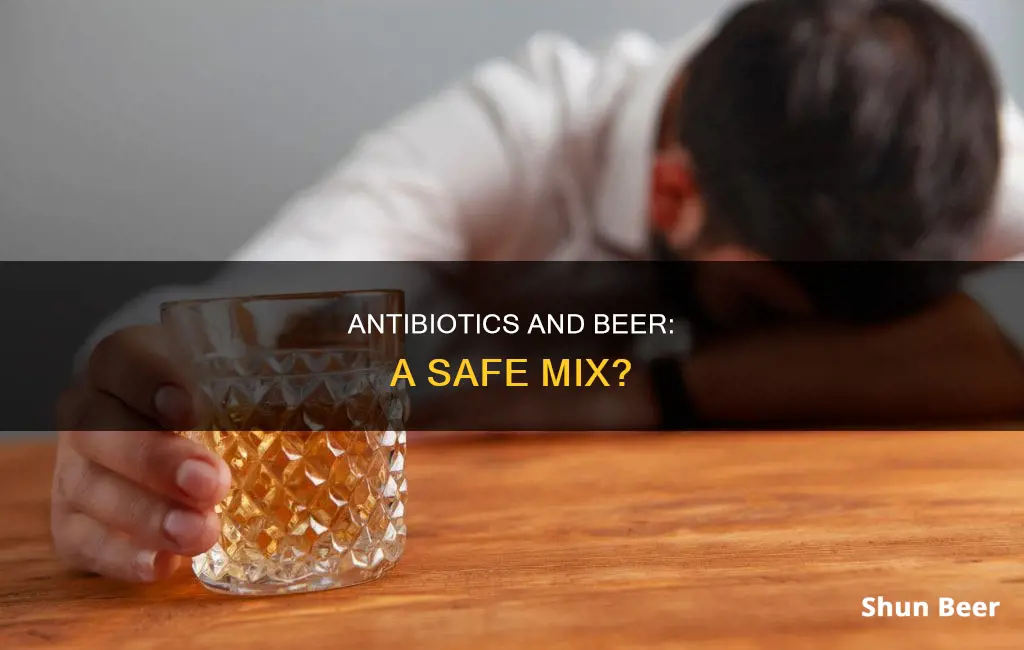
Drinking alcohol while taking antibiotics is generally not recommended, as it can negatively impact your recovery from illness or infection. While moderate alcohol consumption usually doesn't reduce the effectiveness of most antibiotics, it can cause a range of unpleasant side effects and hinder your body's natural healing process.
Alcohol can cause dehydration, upset your stomach, disrupt sleep, and lower your immune response, making it harder for your body to fight off infection. Additionally, some antibiotics, such as Metronidazole and Linezolid, can cause severe reactions when combined with alcohol, including extreme nausea, vomiting, dizziness, and anxiety.
To ensure a safe and effective recovery, it is best to avoid alcohol during your course of antibiotics and follow the advice of your healthcare provider.
| Characteristics | Values |
|---|---|
| Effect on antibiotic effectiveness | Alcohol does not usually affect the effectiveness of antibiotics. However, in some cases, it may change the levels of the drug in the bloodstream, which could alter its effectiveness. |
| Side effects | Alcohol can increase the risk of antibiotic side effects, such as nausea, vomiting, stomach pain, flushing, liver damage, and cognitive impairment. |
| Immune system | Alcohol consumption can negatively impact the immune system, making it harder for the body to fight off infections. |
| Healing | Alcohol can interfere with the body's healing process by disrupting sleep and hydration and the absorption of nutrients. |
| Recommendations | It is generally recommended to avoid alcohol while taking antibiotics. However, moderate alcohol consumption (one drink for women, two drinks for men) is usually considered safe, depending on the specific antibiotic and individual health status. |
What You'll Learn

Alcohol and antibiotics can cause side effects like nausea and vomiting
Alcohol and antibiotics do not mix well together. While alcohol does not make most antibiotics less effective, it can increase your chance of experiencing certain side effects.
When the body breaks down alcohol, it produces acetaldehyde, which can cause nausea. Many antibiotics already cause stomach or digestive side effects, and drinking alcohol while taking them can increase feelings of nausea and even lead to vomiting.
Drinking alcohol while taking antibiotics can also cause a range of other negative side effects, including:
- Increased nausea
- Dehydration
- Diarrhea
- Sleep disruption
- Lowered immune response
- Liver damage
- Kidney damage
- Hindering the body's natural ability to heal itself
Some antibiotics, such as Metronidazole and Linezolid, can cause violent physical reactions when combined with alcohol. It is best to avoid alcohol entirely while taking antibiotics and to follow the advice of your doctor or pharmacist.
Antibiotics and Beer: A Safe Mix?
You may want to see also

Drinking alcohol while taking antibiotics can dehydrate you
Drinking alcohol while taking antibiotics can have several negative effects on your health. One of the main side effects of drinking alcohol is dehydration, which can slow down your recovery. Alcohol can also cause an upset stomach, interrupt normal sleep, and lower your immune response, hindering your body's natural ability to heal itself.
Dr Colleen Clayton, a primary care provider, advises against drinking alcohol while on antibiotics. While moderate alcohol consumption doesn't usually reduce the effectiveness of antibiotics or cause serious interactions, alcohol can reduce your energy and delay your recovery. Clayton states that "dehydration and poor sleep are the main side effects of alcohol that can slow your recovery".
It is best to avoid alcohol until you have completed your course of antibiotics and your body has received adequate rest and nutrition.
If you are taking the antibiotics metronidazole (Flagyl) or tinidazole (Tindamax), it is especially important to avoid alcohol completely. Combining these antibiotics with alcohol can cause extreme nausea and vomiting. Similar but less severe symptoms can occur with Bactrim, a sulfa antibiotic that contains sulfamethoxazole and trimethoprim.
Beer and Bowel Movements: The Laxative Effect
You may want to see also

Alcohol can hinder your body's natural ability to heal itself
Alcohol can have a detrimental effect on the body's ability to heal itself, particularly when combined with antibiotics. Alcohol can cause dehydration, upset stomach, interrupt normal sleep, and lower the immune response, all of which can hinder the body's natural healing process.
Alcohol can also affect the body's inflammatory response, which is crucial for proper healing. It disrupts the production of cytokines and chemokines, which are involved in the recruitment and activation of immune cells, such as neutrophils and macrophages, at the site of injury. This can lead to a delay in wound healing and increase the risk of infection.
Additionally, alcohol can impair the formation of new blood vessels, or angiogenesis, which is essential for restoring oxygenation to the wound bed. It also reduces the production of collagen, a key component of the extracellular matrix that provides structural support to the wound.
Furthermore, alcohol can interfere with signaling pathways involved in bone formation and fracture repair, such as the Wnt/β-catenin signaling pathway. This can lead to decreased callus size and altered callus composition, resulting in impaired bone healing.
Overall, alcohol's ability to disrupt multiple cellular and molecular processes can hinder the body's natural healing abilities, making it more difficult to recover from injuries or illnesses.
Morning Beer: Should You Drink Before Work?
You may want to see also

Alcohol can lower your immune response
Alcohol can have a detrimental effect on the immune system, and it is important to understand the risks before consuming alcohol, especially when taking antibiotics.
Firstly, alcohol acts as a powerful disinfectant, significantly altering the natural balance of bacteria in the mouth and gut. This disruption to the microbiome can lead to inflammatory bowel disease (IBD) and food allergies. The gut, in particular, is vulnerable to the effects of alcohol, as it can break down the intestine's immune system.
Secondly, alcohol consumption is linked to an increased vulnerability to illness. The National Institute on Alcohol Abuse and Alcoholism reports that excessive drinking leads to increased illness and death from infectious diseases such as pneumonia. Alcohol consumption is also associated with a higher risk of developing cancer, especially breast cancer, and can cause liver damage, as the liver is where the majority of alcohol metabolism occurs.
Additionally, alcohol interferes with essential bodily processes such as sleep and hydration, which are critical components of recovery from bacterial illnesses. It can also negatively impact cognitive function, concentration, and coordination.
Furthermore, alcohol can worsen digestive side effects, leading to blood or mucus in the stool, severe diarrhea, intense stomach pain, and uncontrollable vomiting. It can also damage vital organs, including the liver and kidneys.
Finally, alcohol can affect the body's ability to recover from an infection, slowing the healing process and increasing the risk of developing another infection.
In conclusion, alcohol consumption can lower the immune response and have negative consequences for overall health and well-being. It is important to consider these risks and make informed decisions about alcohol consumption, especially when taking antibiotics or dealing with an infection.
The Magic of Beer Widgets: How Do They Work?
You may want to see also

Mixing alcohol and antibiotics can be dangerous for your liver
Mixing Alcohol and Antibiotics: Dangerous for Your Liver
How Alcohol and Antibiotics Affect the Body
When the body breaks down alcohol, it produces acetaldehyde, which can cause nausea. Antibiotics also come with a risk of nausea, vomiting, and diarrhea, and alcohol can amplify these effects. Both alcohol and antibiotics can also hinder cognitive function, concentration, and coordination.
Interference with Body Processes
Drinking alcohol can interfere with essential body processes such as sleep and hydration, which are critical components of recovering from a bacterial illness. Alcohol can also slow down the healing process and recovery time, and put you at risk of developing another infection.
Harmful Interactions
Some antibiotics, such as Metronidazole, Linezolid, Sulfamethoxazole, and Trimethoprim, can cause violent physical reactions when combined with alcohol. Consuming alcohol while taking these antibiotics can result in severe fatigue, throbbing headaches, dizziness, anxiety, chest pain, and heart palpitations.
Liver Damage
Excessive alcohol use is well-known to cause liver damage, such as cirrhosis. Some antibiotics can also damage the liver, and mixing the two may worsen these effects. Signs of liver damage include fever, chills, joint pain or swelling, unusual bleeding or bruising, a skin rash, itching, loss of appetite, fatigue, nausea or vomiting, stomach pain, dark-colored urine, pale-colored stools, or yellowing of the skin or eyes.
Drug Interactions
When mixed with alcohol, some antibiotics may change the way the antibiotic works, making it less effective or causing it to build up and become toxic. This can lead to dangerously high blood pressure, possibly resulting in serious events like heart attacks.
Precautions
It is always best to check with your doctor or pharmacist before mixing alcohol with any medication, including antibiotics, as this can be dangerous for your liver and cause other harmful reactions.
The Science Behind Beer Koozies: Do They Really Work?
You may want to see also
Frequently asked questions
No, it is not safe to drink beer or any other form of alcohol while taking antibiotics. Alcohol can reduce your energy and delay recovery, and it is best to avoid it while on antibiotics.
Drinking alcohol while taking antibiotics can cause severe fatigue, throbbing headaches, dizziness, anxiety, chest pain, heart palpitations, digestive issues, and blood or mucus in the stool. It can also lead to severe diarrhea, intense stomach cramping or pain, and fever.
Yes, moderate alcohol consumption (one drink for women, two drinks for men) is generally considered fine when taking antibiotics. However, it is always best to consult with a doctor or pharmacist before mixing alcohol and antibiotics, as certain antibiotics require you to refrain from drinking altogether.







